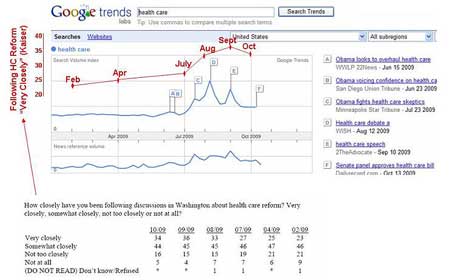The Kaiser Family Foundation survey has been asking a question this year that attempts to gauge how closely people have been following the debate over health care reform. There is always the possibility that some respondents will overstate how closely they are following the debate, in order to present themselves as well-informed, civically engaged citizens. For that reason, it is helpful to obtain independent confirmation of a survey’s general findings, from sources external to the survey itself.
It recently occurred to me that an independent source of information on people’s interest level in a particular news story is the amount of web-searching they do on the story. Google Trends is one site that provides data on how much searching has taken place on an issue. Accordingly, I typed in “health care” to Google Trends and then did a screen capture of the results, shown below (see blue trendlines). I also manually superimposed the trendline (in red) for the percent of respondents who said they were following the health care debate “very closely” in the Kaiser polls.
(click to enlarge)
The two trends — web-searching and poll responses — are on different absolute scales, but I don’t think that matters. What’s important, to my mind, are the arcs of the two trends. For the most part, they seem consistent with each other; both trends rose from July to August, and fell from September to October. One discrepancy is that, whereas the Kaiser poll showed a slight increase in interest from August to September, web-searching suggested a decrease from the August to the September peak. I also did a screen capture of Kaiser’s summary table, for those interested in greater detail (note that, whereas the graphic trendlines go chronologically from left to right, Kaiser’s data table goes chronologically from right to left).
- Bulenox: Get 45% to 91% OFF ... Use Discount Code: UNO
- Risk Our Money Not Yours | Get 50% to 90% OFF ... Use Discount Code: MMBVBKSM
Disclaimer: This page contains affiliate links. If you choose to make a purchase after clicking a link, we may receive a commission at no additional cost to you. Thank you for your support!



Leave a Reply